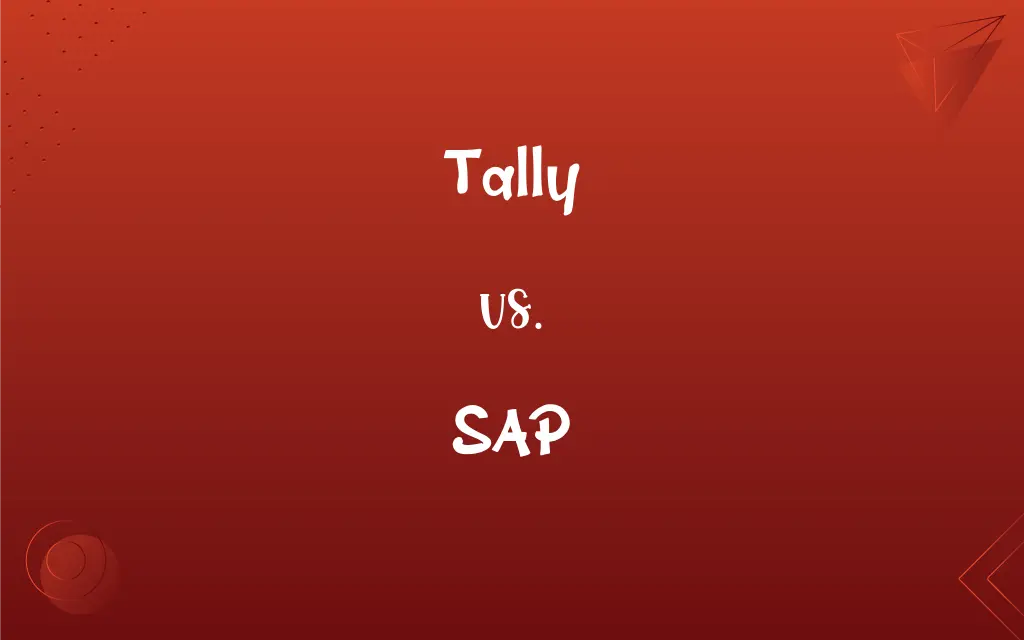Tally vs. SAP: What's the Difference?
Edited by Aimie Carlson || By Harlon Moss || Published on February 4, 2024
Tally is an accounting software primarily for small and medium businesses, focusing on bookkeeping and financial management. SAP is an enterprise resource planning software, offering comprehensive business management solutions across various departments.

Key Differences
Tally and SAP both serve as business software solutions, but they cater to different market segments. Tally is more suitable for small to medium-sized businesses, focusing mainly on accounting and inventory management. On the other hand, SAP is designed for larger organizations and offers a broad spectrum of ERP solutions, encompassing various business processes such as finance, HR, and supply chain management.
Tally's interface and functionalities are generally considered user-friendly and straightforward, making it a popular choice for businesses with simpler accounting needs. SAP, in contrast, offers a more complex and feature-rich environment that requires specialized training, but it provides more extensive capabilities for managing diverse and complex business operations.
In terms of scalability, Tally is often seen as a solution for businesses that do not require extensive customization or integration with other systems. SAP, however, excels in scalability and can be customized extensively to fit the unique processes of large enterprises, often involving integration with multiple other systems.
The cost of implementation and maintenance is another differentiating factor. Tally, being more straightforward and less complex, usually involves lower costs, making it a cost-effective solution for smaller businesses. SAP, with its extensive features and need for customization, typically involves a higher investment, both in terms of initial implementation and ongoing maintenance.
Tally’s primary focus remains on accounting, taxation, and inventory management, making it a specialized tool for financial management. SAP, being an ERP system, covers a broader range of business functions, including but not limited to financials; it integrates various business processes to provide a unified business management solution.
ADVERTISEMENT
Comparison Chart
Target Market
Small to medium-sized businesses
Large enterprises
Core Functionality
Accounting and inventory management
Comprehensive ERP solutions
User Interface
User-friendly and straightforward
Complex and feature-rich
Scalability
Limited customization and integration
Highly scalable with extensive customization
Cost
Generally lower cost
Higher investment and maintenance costs
ADVERTISEMENT
Tally and SAP Definitions
Tally
Provides features like tax compliance and billing.
Tally helps us with GST compliance and invoicing.
SAP
An ERP software used by large organizations for integrated business management.
Our corporation implements SAP for streamlined operations across departments.
Tally
Known for its simplicity and ease of use in accounting.
I find Tally user-friendly for daily accounting tasks.
SAP
Known for its scalability and customization capabilities.
SAP has been customized to fit our unique business processes.
Tally
Popular in small and medium-sized businesses for financial documentation.
Our small business relies on Tally for efficient bookkeeping.
SAP
Requires specialized training due to its complexity.
Our team underwent extensive training to effectively use SAP.
Tally
A software tool for accounting and inventory management.
We use Tally to manage our company's financial accounts and stock.
SAP
Offers a wide range of modules, including finance, HR, and supply chain.
SAP's HR module has simplified our employee management processes.
Tally
Offers basic business management features.
Tally is our go-to for managing basic business operations.
SAP
Integrates various business processes for efficiency.
With SAP, we've improved efficiency by integrating our financial and sales data.
Tally
A reckoning, score, or amount
What was the final tally of votes?.
SAP
The watery fluid that circulates through a plant, carrying food and other substances to the various tissues.
FAQs
What kind of businesses typically use SAP?
SAP is typically used by large enterprises for comprehensive business process management.
Can SAP be customized for specific business needs?
Yes, SAP is highly customizable to meet the specific needs of different businesses.
Is Tally suitable for large enterprises?
Tally is generally more suitable for smaller businesses due to its limited scalability compared to SAP.
Is Tally easy to learn for beginners?
Yes, Tally is known for its user-friendly interface, making it relatively easy for beginners.
Does Tally support multiple currencies?
Yes, Tally supports transactions in multiple currencies, making it suitable for businesses with international dealings.
Can Tally be used for payroll management?
Tally does offer basic payroll features, but it is not as extensive as specialized payroll systems.
Can SAP be integrated with other software?
Yes, SAP can be integrated with a variety of other software, enhancing its functionality.
What is Tally primarily used for?
Tally is primarily used for accounting, taxation, and inventory management in small to medium-sized businesses.
How does SAP improve business efficiency?
SAP improves efficiency by integrating various business processes and providing real-time data analysis and reporting.
What are the key modules in SAP?
Key modules in SAP include finance, HR, supply chain management, and customer relationship management.
What industries commonly use SAP?
SAP is commonly used across various industries, including manufacturing, retail, healthcare, and finance.
Does Tally support mobile access?
Tally offers limited mobile access capabilities compared to more advanced ERP systems like SAP.
Are there specific versions of SAP for different business sizes?
Yes, SAP offers different versions and modules to cater to various business sizes and needs.
Is Tally compatible with GST regulations in India?
Yes, Tally is updated to comply with GST regulations in India, making it a popular choice for Indian businesses.
Does SAP offer cloud-based solutions?
Yes, SAP offers cloud-based solutions, providing greater flexibility and scalability.
What is the cost difference between Tally and SAP?
Generally, Tally is more cost-effective for smaller businesses, while SAP requires a higher investment for larger enterprises.
Can Tally handle complex supply chain management?
Tally is not ideally suited for complex supply chain management, a function better handled by ERP systems like SAP.
How is data security handled in Tally?
Tally provides data security features such as encryption and secure access controls.
How user-friendly is SAP for an average employee?
SAP is complex and typically requires specialized training for users to navigate efficiently.
How frequently does Tally release updates?
Tally releases updates periodically, especially to comply with changing tax laws and user requirements.
About Author
Written by
Harlon MossHarlon is a seasoned quality moderator and accomplished content writer for Difference Wiki. An alumnus of the prestigious University of California, he earned his degree in Computer Science. Leveraging his academic background, Harlon brings a meticulous and informed perspective to his work, ensuring content accuracy and excellence.
Edited by
Aimie CarlsonAimie Carlson, holding a master's degree in English literature, is a fervent English language enthusiast. She lends her writing talents to Difference Wiki, a prominent website that specializes in comparisons, offering readers insightful analyses that both captivate and inform.




































































